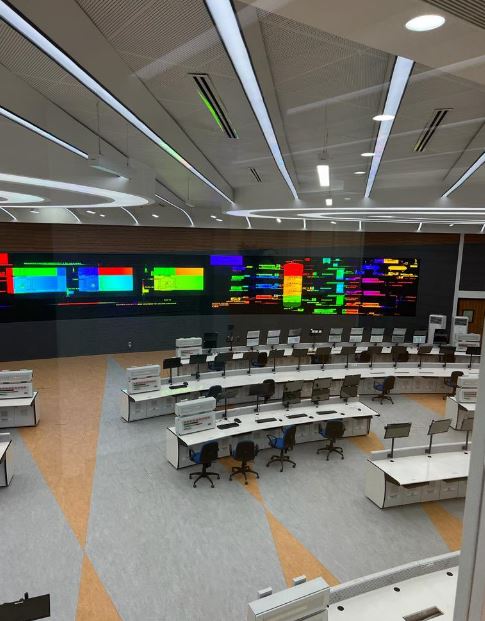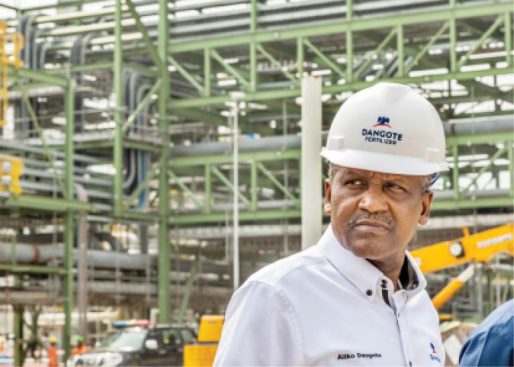President Muhammadu Buhari is set to commission the Dangote refinery located at the Lekki free zone near Lagos. The refinery has a capacity of 650,000 barrels per day and was commissioned on Monday, 22nd May.
Notably, the refinery reportedly boasts the world’s largest pipeline infrastructure, stretching over 1,100 kilometers, and it has the capability to process 3 billion standard cubic feet of gas daily.
The inauguration of this refinery carries significant expectations within the Nigerian energy sector, especially with the government’s plans to eliminate petrol subsidy in the latter half of the year. Fuel subsidy payments have seen a steady increase from N351 billion in 2005 to N4.39 trillion in 2022, and a budget of N3.6 trillion has been allocated to fuel subsidy for the first six months of 2023.
The government places great hope on the Dangote refinery to help put an end to fuel imports. In a notable shift, the federal government granted approval for the Nigerian National Petroleum Corporation (NNPC) Limited to acquire a 20 percent stake worth $2.76 billion in the Dangote Refinery in 2021.
Aliko Dangote, Africa’s wealthiest individual, spearheaded the construction of this immense complex, which stands as one of Nigeria’s largest investments. It encompasses a 435-megawatt power station, a deep seaport, and a fertilizer unit.
Anticipated to fulfill the entirety of Nigeria’s refined product needs and generate surplus for export, the refinery is designed to process Nigerian crude as well as other types of crude oil. It will produce gasoline, diesel, jet fuel, and polypropylene, all meeting the quality standards of Euro-V, as well as adhering to environmental norms set by the World Bank, US EPA, European emission standards, and the Department of Petroleum Resources (DPR) emission/effluent regulations.

The refinery is projected to provide a platform for the sale of Nigerian crude oil, generating 1 billion annually and contributing to foreign exchange earnings of 9.9 billion.
Following substantial delays over the years, the cost of the refinery escalated to 19 billion, surpassing the initial estimates of 12 billion to $14 billion.
As per the report published by S&P Global Commodity Insights, the Dangote Refinery is scheduled to receive its initial shipment of crude oil in June.
In a recent publication entitled “Refineries watch Q4 2022,” Hawilti, a Pan-African investment research firm, highlighted the potential of the forthcoming private refinery to redefine the country’s domestic refining capability.
“Both the opening of the Dangote refinery and the rehabilitation of state-owned refineries have the potential to make Nigeria Africa’s biggest refining hub by 2025.
“With all state-run refineries undergoing rehabilitation, Nigeria imports all its petroleum products and heavily subsidizes gasoline. It needs the Dangote Refinery to decrease imports, generate currency savings, fight inflation, and ultimately improve its macroeconomic outlook,” it said.
The International Monetary Fund (IMF) also projected that the Dangote Refinery would help Nigeria’s economic recovery drive when it starts production.
“With crude oil for local refining not subject to the Organisation of Petroleum Exporting Countries (OPEC) quota, the refinery also has the potential to catalyse more domestic crude oil production and boost gross domestic product (GDP),” IMF said.
According to Chinyere Almona, Director-general of the Lagos Chamber of Commerce and Industry (LCCI), the refinery will have multiple benefits. They include preserving and generating foreign currency, generating employment opportunities, having a positive impact on the value of the national currency, enhancing prosperity in the downstream sector, and creating avenues for business growth.
“The LCCI views the refinery’s impact on the Nigerian economy as significant. It will also stimulate economic growth by impacting the country’s balance of payments.
“In addition, the Chamber expects the refinery to fuel further growth and development across its value chain, including cosmetics, plastics, textiles etc,” she said.
In an exclusive interview with The Economist Magazine based in London, Aliko Dangote, CEO of Dangote Group, stated that once the refinery begins operations, Nigeria stands to conserve approximately 10 billion in foreign currency reserves and generate an additional 10 billion through exports.
He said, “The refinery’s completion will not only create direct and indirect jobs but will also lead to skills transfer and technology acquisition opportunities that will benefit the downstream sector.
“Moreover, the refinery’s production of critical products like naphtha and polypropylene will stimulate the development of other industries, such as cosmetics, plastics, and textiles.
“Refineries on this scale could save Nigeria up to $10 billion in foreign exchange and generate approximately $10 billion from exports.”
Among the dignitaries anticipated to attend the occasion on Monday are Togo’s President Gnassingbé Eyadéma, Senegal’s President Macky Sall, Niger Republic’s President Mohamed Bazoum, and Chad’s President Mahamat Déby. Additionally, Ghana’s President Nana Akufo-Addo and Rwanda’s Paul Kagame are also slated to participate in this momentous event.



